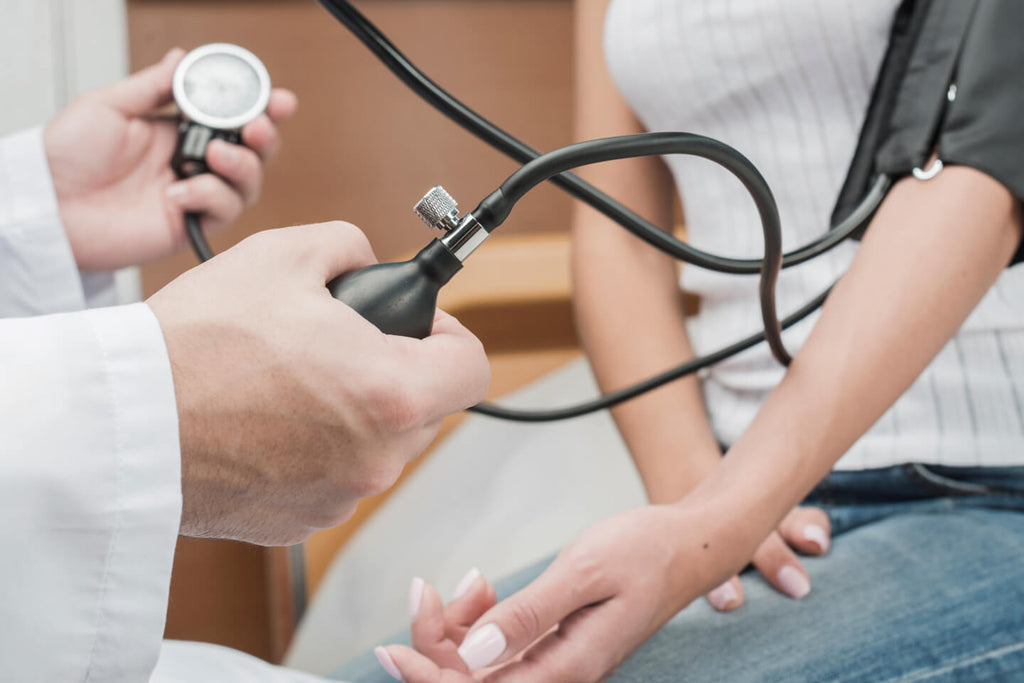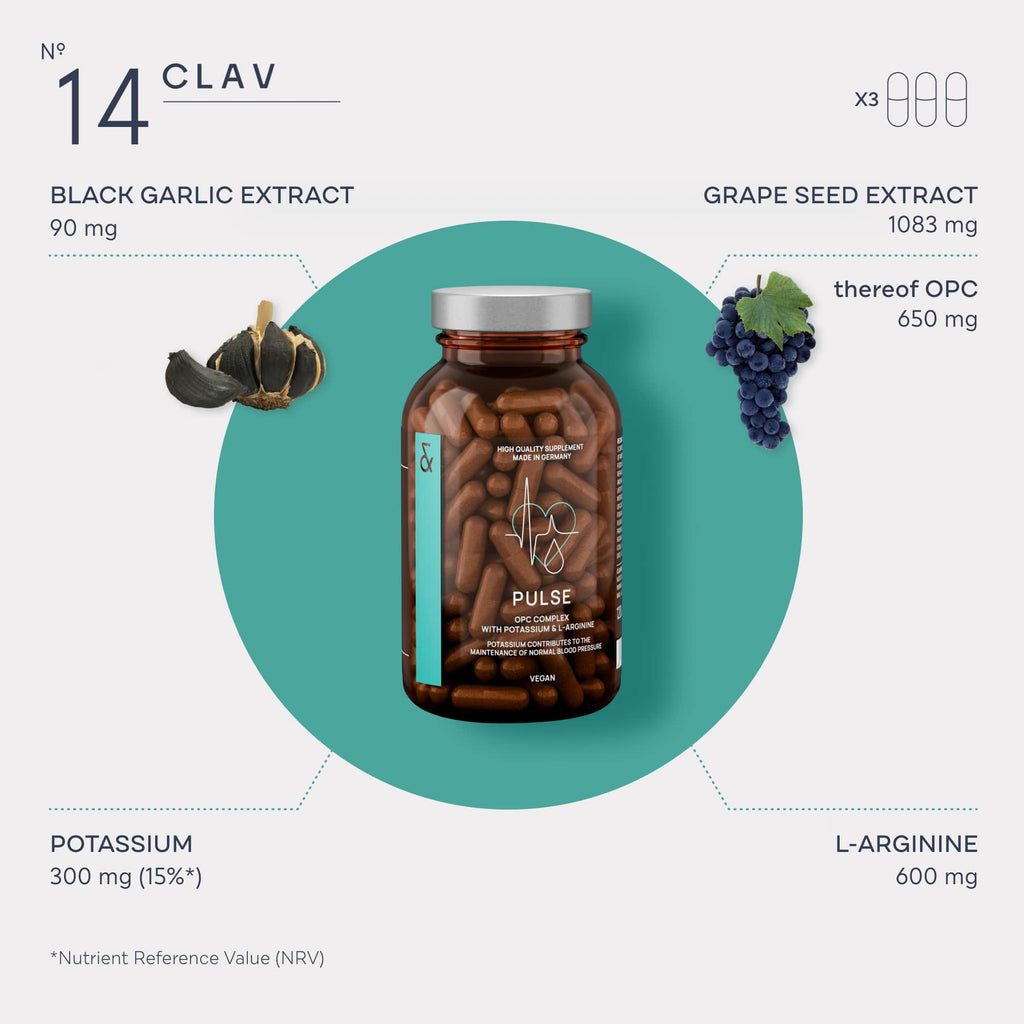Grape seed extract is no longer an insider tip when it comes to vitality and well-being. Many beneficial properties are attributed to this plant substance, including those for the heart and blood pressure, against varicose veins and for skin and hair. Here you can find out what makes this extract so powerful and how you can use grape seed extract to support your well-being.
Contents
What are antioxidants?
Plants have one major disadvantage when it comes to self-defence - they can't run away from predators or seek shelter in the shade from the burning sun. However, they have other tricks up their sleeve to compensate. They contain various substances that help them protect themselves against many external influences. UV radiation and other environmental influences cause an excess of free radicals in the cells, a condition known as oxidative stress. If this continues in the long term, it causes damage to the cell walls or even the death of cells. Antioxidants are plant substances that have the ability to render these free radicals harmless. This restores the balance in the cell and the cells and cell walls remain intact. Antioxidants are therefore the protective shields of plants, which we humans can also use to protect ourselves.
The best-known antioxidants are probably vitamin C, vitamin E and beta-carotene (provitamin A). They cannot be produced by the body, which is why we are dependent on ingesting them through a balanced diet. Other secondary plant substances such as polyphenols and flavonoids are also good helpers in protecting your cells. Even though vitamin C is a tried and tested antioxidant, we now know that there are plant substances that surpass it in terms of strength and efficiency.
OPC - the power antioxidant
OPC is short for oligomeric proanthocyanidins. These secondary plant substances belong to the group of polyphenols and are found in particularly high concentrations in grape seeds. These substances are also the reason why the idea of a glass of red wine a day being healthy is so widespread. Researchers have long been puzzled by the fact that the incidence of cardiovascular disease and high blood pressure is relatively low in France, despite the fact that the widespread diet there is very rich in saturated fatty acids, sugar and carbohydrates from white flour. On closer investigation of the phenomenon, it was found that certain substances in red wine counteract the negative effects on the heart and blood pressure.1 Of course, this is not a recommendation to consume alcohol, as there are many other reasons not to include alcohol in your daily diet. Fortunately, you can also utilise the positive properties of grape seeds and OPC in other ways.
High-quality grape seed extracts with a high OPC content are available in the form of capsules, which you can easily integrate into your daily routine. In this way, you can utilise the power of grape seeds without resorting to alcoholic drinks. The possible positive effects of a long-term intake of OPC are incredibly diverse.

Effects of OPC on the heart and blood vessels
A human study with grape seed extract has shown that a daily intake of 300 mg has a positive effect on blood pressure. A decrease in systolic blood pressure of 5.6% and diastolic blood pressure of 6.7% was recorded. It was even shown that subjects with a higher initial blood pressure experienced a greater reduction, almost twice as much as those with a lower initial blood pressure. After the intake was stopped, the blood pressure of all participants went up again, back to the initial value.3 A positive effect of OPC on blood pressure was also observed in other studies.2 These findings suggest that OPC from grape seed extract can be an effective means of regulating blood pressure. However, it should be a constant companion in order to maintain low values in the long term.
Biochemically, the effect of OPC on blood pressure can be explained by the fact that it inhibits the formation of an enzyme that causes blood vessels to constrict. If the vessels become narrower, the blood has to be pumped with more pressure in order to reach all the arteries and organs - the blood pressure rises. Preventing the vessels from constricting is therefore an important factor in regulating blood pressure. The so-called angiotensin-converting enzyme (ACE) is already the focus of treatment for hypertension and is influenced with medication (ACE inhibitors). Various studies indicate that grape seed extract could provide natural support for this effect in order to keep blood pressure in balance.7
Another risk factor for the heart and blood vessels is the formation of deposits (plaques) in the arteries. These lead to narrowing of the blood vessels, which increases blood pressure and can result in a heart attack or stroke if left unchecked. In a study of patients who already had plaque build-up, a reduction of 25% was observed after twelve months of taking OPC-rich grape seed extract. After two years, this figure was even almost 50%.14 As the usual treatment for severe narrowing of vessels, especially around the heart, is the insertion of a stent. This small implant keeps the artery open at the affected site and thus secures the blood supply to the heart. Of course, such an intervention is associated with many risks. Taking substances such as OPC and changing your diet are simple measures that could prevent such a procedure in later years.
Protection for the brain and nerves
Oxidative stress not only affects the heart and blood vessels. Damage to cells can also affect the nerves, the brain or even the DNA. Long-term consequences include, for example, Alzheimer's or Parkinson's disease, which are caused by damage to the nerves. Here, antioxidants can play an important role in protecting cells and preventing long-term diseases, and researchers even recommend taking them.8 Experiments on rats have shown evidence of a positive effect on memory, brain cells and limb coordination. This also paves the way for possible support in the event of a stroke.11 Whether as a preventive measure or to support treatment, antioxidants play an important role in protecting cells and nerves from free radicals.
OPC as an anti-aging agent
In the beauty industry, too, OPC is firmly established as an anti-ageing agent for radiant skin. This is not surprising, as oxidative stress and the premature cell ageing it causes are among the main causes of blemishes such as wrinkles, hyperpigmentation and age spots. Human studies show an improvement in the skin's moisture content and a reduction in hyperpigmentation with the regular intake of OPC from grape seed extract.9 This is mainly attributed to the improved blood circulation in the skin, which means that the cells can regenerate better. A higher moisture content means greater elasticity of the skin, which also means fewer or reduced wrinkles.

Ad
OPC can do much more
There are countless animal and volunteer studies that indicate further health-promoting effects of OPC. One study on animals, for example, showed effects in relation to rheumatoid arthritis, the painful inflammation of joints, and the maintenance of healthy bones.10 OPC has also been found to have positive effects on wound healing. It stimulates the formation of new blood vessels, which leads to a better supply of newly formed tissue and thus faster healing of the wound.12 In a study of volunteers who had moles removed, wound healing was almost twice as fast with the help of a 2% OPC cream. The wounds treated with OPC were completely healed after an average of eight days, while the placebo group took 14 days to heal.13
Used both internally and externally, OPC therefore appears to be a real all-rounder. In particular, the positive effects that this antioxidant could have on the heart, blood pressure and blood vessels are very promising.
The number of high blood pressure patients is steadily increasing. According to estimates by the World Health Organisation (WHO), 76 million deaths could be avoided between 2023 and 2050 if the proportion of people who have their high blood pressure under control were to rise from the current 21% to 50%.15 Preventing high blood pressure and heart disease is in each individual's own hands. In addition to valuable secondary plant substances such as OPC, which can help you do this, there are a few changes you can make in your everyday life to get your blood pressure under control and prevent high blood pressure. You can find out more about this in this article: High blood pressure - possible causes and preventative measures.
- Renaud S, Gueguen R. The French paradox and wine drinking. Novartis Found Symp. 1998;216:208-17; discussion 217-22, 152-8. doi: 10.1002/9780470515549.ch13. PMID: 9949795. https://pubmed.ncbi.nlm.nih.gov/9949795/
- Park E, Edirisinghe I, Choy YY, Waterhouse A, Burton-Freeman B. Effects of grape seed extract beverage on blood pressure and metabolic indices in individuals with pre-hypertension: a randomised, double-blinded, two-arm, parallel, placebo-controlled trial. British Journal of Nutrition. 2016;115(2):226-238. doi:10.1017/S0007114515004328 https://pubmed.ncbi.nlm.nih.gov/26568249/
- Draijer R, de Graaf Y, Slettenaar M, de Groot E, Wright CI. Consumption of a polyphenol-rich grape-wine extract lowers ambulatory blood pressure in mildly hypertensive subjects. Nutrients. 2015 Apr 30;7(5):3138-53. doi: 10.3390/nu7053138. PMID: 25942487; PMCID: PMC4446743. https://www.ncbi.nlm.nih.gov/pmc/articles/PMC4446743/
- Lu MC, Yang MD, Li PC, Fang HY, Huang HY, Chan YC, Bau DT. Effect of Oligomeric Proanthocyanidin on the Antioxidant Status and Lung Function of Patients with Chronic Obstructive Pulmonary Disease. In Vivo. 2018 Jul-Aug;32(4):753-758. doi: 10.21873/invivo.11304. PMID: 29936455; PMCID: PMC6117753. https://www.ncbi.nlm.nih.gov/pmc/articles/PMC6117753/
- Ning Peng,John T. Clark,Jeevan Prasain,Helen Kim,C. Roger White, andJ. Michael Wyss. Antihypertensive and cognitive effects of grape polyphenols in estrogen-depleted, female, spontaneously hypertensive rats. American Journal of Physiology, Vol. 289, Issue 3, pp. R771-R775. https://journals.physiology.org/doi/full/10.1152/ajpregu.00147.2005
- Feringa HH, Laskey DA, Dickson JE, Coleman CI. The effect of grape seed extract on cardiovascular risk markers: a meta-analysis of randomized controlled trials. J Am Diet Assoc. 2011 Aug;111(8):1173-81. doi: 10.1016/j.jada.2011.05.015. PMID: 21802563. https://pubmed.ncbi.nlm.nih.gov/21802563/
- Ottaviani JI, Actis-Goretta L, Villordo JJ, Fraga CG. Procyanidin structure defines the extent and specificity of angiotensin I converting enzyme inhibition. Biochimie. 2006 Mar-Apr;88(3-4):359-65. doi: 10.1016/j.biochi.2005.10.001. Epub 2005 Oct 26. PMID: 16330143. https://pubmed.ncbi.nlm.nih.gov/16330143/
- Uttara B, Singh AV, Zamboni P, Mahajan RT. Oxidative stress and neurodegenerative diseases: a review of upstream and downstream antioxidant therapeutic options. Curr Neuropharmacol. 2009 Mar;7(1):65-74. doi: 10.2174/157015909787602823. PMID: 19721819; PMCID: PMC2724665. https://www.ncbi.nlm.nih.gov/pmc/articles/PMC2724665/
- Tsuchiya T, Fukui Y, Izumi R, Numano K, Zeida M. Effects of oligomeric proanthocyanidins (OPCs) of red wine to improve skin whitening and moisturizing in healthy women - a placebo-controlled randomized double-blind parallel group comparative study. Eur Rev Med Pharmacol Sci. 2020 Feb;24(3):1571-1584. doi: 10.26355/eurrev_202002_20215. PMID: 32096209. https://pubmed.ncbi.nlm.nih.gov/32096209/
- Park JS, Park MK, Oh HJ, Woo YJ, Lim MA, Lee JH, Ju JH, Jung YO, Lee ZH, Park SH, Kim HY, Cho ML, Min JK. Grape-seed proanthocyanidin extract as suppressors of bone destruction in inflammatory autoimmune arthritis. PLoS One. 2012;7(12):e51377. doi: 10.1371/journal.pone.0051377. Epub 2012 Dec 10. PMID: 23251512; PMCID: PMC3519627. https://www.ncbi.nlm.nih.gov/pmc/articles/PMC3519627/
- Sarkaki A, Rafieirad M, Hossini SE, Farbood Y, Motamedi F, Mansouri SM, Naghizadeh B. Improvement in Memory and Brain Long-term Potentiation Deficits Due to Permanent Hypoperfusion/Ischemia by Grape Seed Extract in Rats. Iran J Basic Med Sci. 2013 Sep;16(9):1004-10. PMID: 24171080; PMCID: PMC3804838. https://www.ncbi.nlm.nih.gov/pmc/articles/PMC3804838/
- Gupta M, Dey S, Marbaniang D, Pal P, Ray S, Mazumder B. Grape seed extract: having a potential health benefits. J Food Sci Technol. 2020 Apr;57(4):1205-1215. doi: 10.1007/s13197-019-04113-w. Epub 2019 Sep 30. PMID: 32180617; PMCID: PMC7054588. https://www.ncbi.nlm.nih.gov/pmc/articles/PMC7054588/
- Hemmati AA, Foroozan M, Houshmand G, Moosavi ZB, Bahadoram M, Maram NS. The topical effect of grape seed extract 2% cream on surgery wound healing. Glob J Health Sci. 2014 Oct 29;7(3):52-8. doi: 10.5539/gjhs.v7n3p52. PMID: 25948437; PMCID: PMC4802053. https://www.ncbi.nlm.nih.gov/pmc/articles/PMC4802053/
- Cao AH, Wang J, Gao HQ, Zhang P, Qiu J. Beneficial clinical effects of grape seed proanthocyanidin extract on the progression of carotid atherosclerotic plaques. J Geriatr Cardiol. 2015 Jul;12(4):417-23. doi: 10.11909/j.issn.1671-5411.2015.04.014. PMID: 26345394; PMCID: PMC4554789. https://www.ncbi.nlm.nih.gov/pmc/articles/PMC4554789/
- World Health Organization. Global report on hypertension: the race against a silent killer, 2023. https://www.who.int/teams/noncommunicable-diseases/hypertension-report




 DE-ÖKO-006
DE-ÖKO-006
